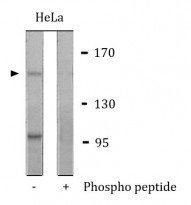ARG66666
anti-MST1R / RON phospho (Ser1394) antibody
anti-MST1R / RON phospho (Ser1394) antibody for Western blot and Human,Mouse
Overview
| Product Description | Rabbit Polyclonal antibody recognizes MST1R / RON phospho (Ser1394) |
|---|---|
| Tested Reactivity | Hu, Ms |
| Tested Application | WB |
| Host | Rabbit |
| Clonality | Polyclonal |
| Isotype | IgG |
| Target Name | MST1R / RON |
| Antigen Species | Human |
| Immunogen | Phosphospecific peptide around Ser1394 of Human MST1R / RON. |
| Conjugation | Un-conjugated |
| Alternate Names | CD136; CDw136; EC 2.7.10.1; RON; PTK8; Protein-tyrosine kinase 8; CD antigen CD136; p185-Ron; Macrophage-stimulating protein receptor; MSP receptor |
Application Instructions
| Application Suggestion |
|
||||
|---|---|---|---|---|---|
| Application Note | * The dilutions indicate recommended starting dilutions and the optimal dilutions or concentrations should be determined by the scientist. | ||||
| Observed Size | ~ 150 kDa |
Properties
| Form | Liquid |
|---|---|
| Purification | Affinity purification with immunogen. |
| Buffer | PBS, 0.02% Sodium azide, 50% Glycerol and 0.5% BSA. |
| Preservative | 0.02% Sodium azide |
| Stabilizer | 50% Glycerol and 0.5% BSA |
| Concentration | 1 mg/ml |
| Storage Instruction | For continuous use, store undiluted antibody at 2-8°C for up to a week. For long-term storage, aliquot and store at -20°C. Storage in frost free freezers is not recommended. Avoid repeated freeze/thaw cycles. Suggest spin the vial prior to opening. The antibody solution should be gently mixed before use. |
| Note | For laboratory research only, not for drug, diagnostic or other use. |
Bioinformation
| Database Links |
Swiss-port # Q04912 Human Macrophage-stimulating protein receptor Swiss-port # Q62190 Mouse Macrophage-stimulating protein receptor |
|---|---|
| Gene Symbol | MST1R |
| Gene Full Name | macrophage stimulating 1 receptor |
| Background | This gene encodes a cell surface receptor for macrophage-stimulating protein (MSP) with tyrosine kinase activity. The mature form of this protein is a heterodimer of disulfide-linked alpha and beta subunits, generated by proteolytic cleavage of a single-chain precursor. The beta subunit undergoes tyrosine phosphorylation upon stimulation by MSP. This protein is expressed on the ciliated epithelia of the mucociliary transport apparatus of the lung, and together with MSP, thought to be involved in host defense. Alternatively spliced transcript variants encoding different isoforms with different structural and biochemical properties have been described (PMID:8816464). [provided by RefSeq, Oct 2011] |
| Function | Receptor tyrosine kinase that transduces signals from the extracellular matrix into the cytoplasm by binding to MST1 ligand. Regulates many physiological processes including cell survival, migration and differentiation. Ligand binding at the cell surface induces autophosphorylation of RON on its intracellular domain that provides docking sites for downstream signaling molecules. Following activation by ligand, interacts with the PI3-kinase subunit PIK3R1, PLCG1 or the adapter GAB1. Recruitment of these downstream effectors by RON leads to the activation of several signaling cascades including the RAS-ERK, PI3 kinase-AKT, or PLCgamma-PKC. RON signaling activates the wound healing response by promoting epithelial cell migration, proliferation as well as survival at the wound site. Plays also a role in the innate immune response by regulating the migration and phagocytic activity of macrophages. Alternatively, RON can also promote signals such as cell migration and proliferation in response to growth factors other than MST1 ligand. [UniProt] |
| Cellular Localization | Membrane; Single-pass type I membrane protein. [UniProt] |
| Calculated MW | 152 kDa |
| PTM | Proteolytic processing yields the two subunits. Autophosphorylated in response to ligand binding on Tyr-1238 and Tyr-1239 in the kinase domain leading to further phosphorylation of Tyr-1353 and Tyr-1360 in the C-terminal multifunctional docking site. Ubiquitinated. Ubiquitination by CBL regulates the receptor stability and activity through proteasomal degradation. [UniProt] |
Images (2) Click the Picture to Zoom In
-
ARG66666 anti-MST1R / RON phospho (Ser1394) antibody WB image
Western blot: HeLa cells treated with TNF alpha (20 ng/ml for 2 min), Cell lysates stained with ARG66666 anti-MST1R / RON phospho (Ser1394) antibody. The lane on the right is blocked with the phospho peptide.
-
ARG66666 anti-MST1R / RON phospho (Ser1394) antibody WB image
Western blot: 3T3 cell lysate stained with ARG66666 anti-MST1R / RON phospho (Ser1394) antibody at 1:500 dilution.







